Casting On Grass
- Details
- Published on Sunday, 22 November 2009 18:52
- Written by Fred Carrie
 Sorry to mislead all you sad casting geeks out there, but this article is not about what you think.
Sorry to mislead all you sad casting geeks out there, but this article is not about what you think.
Yeah, like most serious fly fishers I do a bit of practice casting on grass myself, in our own private field
I hasten to add as this avoids the chants and jibes of normal people down at the park wondering what the hell you are doing.
"Have ye caught onythin’ ” or “Yee’ll no’ catch much there mister”, being two of their favourite humiliation strategies.
If you want to improve your fly casting, practice is essential and grass is hard to beat. For a start you don’t need a permit although for many anglers I know his would be, at best, a moot point.
However, as I said, this article is not about what you think, so enough of that casting stuff.
 I recall reading, several years ago, an article by Paul Arden about fishing in New Zealand. Paul talked a lot about rain, having to climb trees to escape floods and stuff like that It rains a bit there. I can endorse that. I’ve visited a few places over the years, North America, The European Alps, The Himalayas a few times at the tail end of the monsoon, even Glencoe and boy that’s wet, but the intensity of rain on New Zealand South Island’s west coast really does take a bit of beating.
I recall reading, several years ago, an article by Paul Arden about fishing in New Zealand. Paul talked a lot about rain, having to climb trees to escape floods and stuff like that It rains a bit there. I can endorse that. I’ve visited a few places over the years, North America, The European Alps, The Himalayas a few times at the tail end of the monsoon, even Glencoe and boy that’s wet, but the intensity of rain on New Zealand South Island’s west coast really does take a bit of beating.
We all know it rains a lot here in Scotland, in fact some of us constantly complain it seldom does anything else. The wettest places here are around the hills at the head of Loch Quoich and in the hills around Kinlochewe where they get a mere 5 meters. Some parts of New Zealand South Island’s west coast enjoy up to 8 meters annually.
If I were to claim that on our last visit we experienced most of that over 3 days it would be a slight exaggeration, but for sheer bloody mindedness, that rain really did take a bit of beating.
At least it was warm.
My pal Alex and myself were heading down the west coast to the small settlement of Hari Hari, having enjoyed some great fishing and fine weather further north There are some nice spring creeks around there where Alex had some great fishing the previous year. My wading boots had disintegrated, so we stopped off at a tackle shop in Greymouth so I could buy a new pair.
“So where are you fellas headed?” asked the friendly assistant having just relieved me of a 120 quid for a pair of new boots.
We told him.
“Well, you fellas are really gonna struggle there I can tell ya, the fish in them creeks are dead spooky at this time of year and bloody hard to catch.”
That sounded encouraging. Where the hell are you taking me Alex?
I wasn’t really worried though, I’m used to catching sod all on a frequent basis. My local river is the Aberdeenshire Don, home of the dourest, most bloody minded trout in the Northern Hemisphere. After years fishing there I’m blank-hardened. Dour, dispiriting rivers? These Kiwis don’t know the half of it.
Anyway, on arrival in Hari Hari it was all looking very encouraging. We checked into a comfortable and not overly expensive chalet at the Flaxbush Motel, had a bite to eat then headed down to La Fontaine Stream a well known, even quite famous South Island spring creek that holds good numbers of brown trout averaging about 3 lb.
Nzfishing.com says: “Regarded as one of the finest fly fishing rivers in the South Island the La Fontaine is a river to challenge the experienced angler.”
I put that quote in because we caught a few fish, if we hadn’t I’d probably have left it out.
That was a great evening; we had several fish between 2 and 3 ¾ lbs on small dry flies. Classic ‘chalk stream’ fly fishing. However, on the way back to the motel, the car radio was warning of some pretty severe weather with prolonged and very heavy rain heading our way.
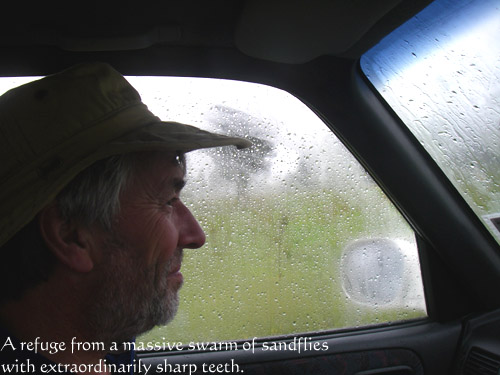 It rained overnight, but was dryish next morning. We foolishly thought we had missed the worst of it. We headed off down to the estuary of another local river to try our hand at fishing for Kahawai a hard fighting sea fish that enters rivers at high tide and has a reputation for ripping fly fisher’s arms out of their sockets. The tide was wrong and we caught nothing.
It rained overnight, but was dryish next morning. We foolishly thought we had missed the worst of it. We headed off down to the estuary of another local river to try our hand at fishing for Kahawai a hard fighting sea fish that enters rivers at high tide and has a reputation for ripping fly fisher’s arms out of their sockets. The tide was wrong and we caught nothing.
I won’t tell you what Nzfishing.com has to say about it.
As the day wore on the skies darkened and eventually the real rain arrived. We had a half hearted attempt back on La Fontaine that evening, but it was just too miserable. We soon gave up and headed back for beer. By this time the rain was torrential.
Next day we had a look at the creek and not surprisingly it was in flood and still rising. By now the rain was the worst I have ever seen. No way I was going out in that, the pub was calling. Alex is made of sterner stuff though and suggested we drive down the coast to Whataroa, past which lies Lake Whahapo, it just might be clear enough to fish.
It wasn’t.
We had a half hearted attempt in a hydro canal at the outflow of the lake and Alex, who was studying for his SGAIC fishing instructor qualification, tried his coaching routine out on me before I fled to the car blaming a sudden and ferocious increase in the intensity of the storm and an approaching, massive swarm of sandflies with extraordinarily sharp teeth.
That’s what friends are for after all.
We drove back to Whataroa, had some lunch and bought some fresh supplies. The shop sold two of NZ’s premier 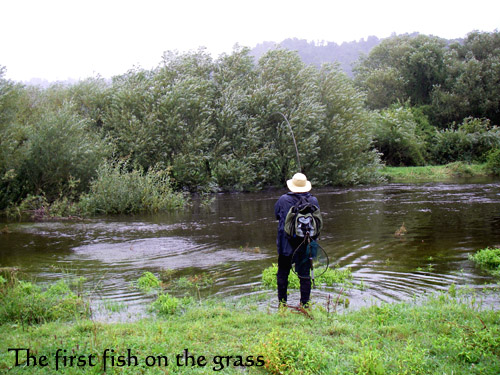 sporting publications “Pig Hunter” and “Hooked on Boars”. That helped lighten the mood. Hooked on Boars – how bizarre is that? I later forgot to buy a copy as a souvenir. Must remember to get one next February.
sporting publications “Pig Hunter” and “Hooked on Boars”. That helped lighten the mood. Hooked on Boars – how bizarre is that? I later forgot to buy a copy as a souvenir. Must remember to get one next February.
We drove back to Hari Hari wondering when or even if we were going to get out fishing again. It did not look promising. Before hitting the pub to drown our sorrows (it was only about 4.00 PM) we thought we’d check the creek again just to assess the damage. It had stopped raining for now, so nothing lost.
La Fontaine was a bit coloured, very ,very high and running in the fields. Alex noticed a fish rise in the field.
It was time to cast on the grass.
We got changed and tackled up.
I cast onto the grass and caught the riser on a Klinkhamer. A fish of about 2lb. I had it landed before it even realised it was hooked. After playing 5, 6 and 7 pounders fish of 2 lb are landed quickly. I also knew if I did not get it out quickly I was bound to loose it in the submerged gorse bushes, willows, thistles and other former terrestrial hazards. Alex was killing himself laughing and shouting “you’re gonnae break yer rod ye eejit!” .
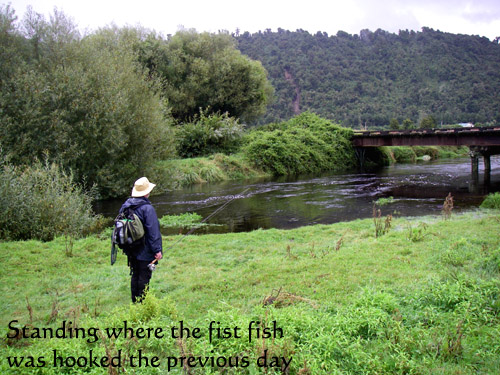 The fish had left the main channel of the river taking refuge in the various backwaters and lagoons the flood had created. They were taking full advantage of the new food supply, feeding furiously, throwing their normal caution to the flood. It was unbelievable. It was also amazing just how quickly we forgot about the rain.
The fish had left the main channel of the river taking refuge in the various backwaters and lagoons the flood had created. They were taking full advantage of the new food supply, feeding furiously, throwing their normal caution to the flood. It was unbelievable. It was also amazing just how quickly we forgot about the rain.
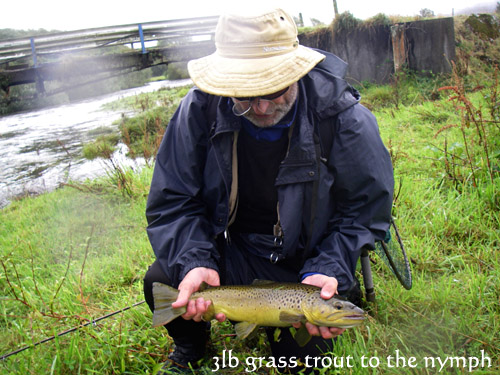 We saw lots of fish. We didn’t catch them all of course, but we did get a few. I got another of about 3lb on a small wire nymph, Alex had 3 from 2 ½ to 4lb, two on the nymph and one at the death on a woolly bugger. The fishing that evening was superb. To see big trout feeding on what was a footpath the day before was bizarre. It was exhilarating fishing.
We saw lots of fish. We didn’t catch them all of course, but we did get a few. I got another of about 3lb on a small wire nymph, Alex had 3 from 2 ½ to 4lb, two on the nymph and one at the death on a woolly bugger. The fishing that evening was superb. To see big trout feeding on what was a footpath the day before was bizarre. It was exhilarating fishing.
By next morning the creek had fallen massively, but was still very high. We met an ex. Brit now living in Invercargill called Alan who was staying at the motel with his wife. A coarse fisher before he left England and now keen on game fishing. He had been mainly fishing for kahawai in the sea at the river estuaries and having heard our stories fancied a crack at the trout. We took him down to La Fontaine to show him the ropes. Sadly all the lagoons were drying out and the fish were back in the main channel of the river. This made them very hard to catch in the high water, they were probably tucked well under the banks. There was only one thing to do; a bit of woolly buggering. At one point Alex was fishing huge, heavy nymphs under a fish pimp as I woolly buggered about. He commented, “here’s us fishing a pristine ‘chalk stream’, you’re spinning and I’m float fishing”. That about summed it up really. We both had a few hits to the buggers, but as so often happens with these lures, no hook ups.
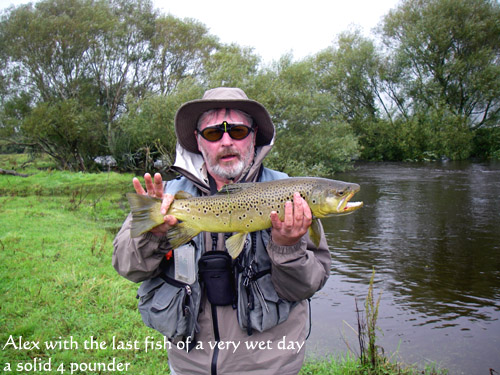 Walking the banks that day it was odd to think we were standing in places where we had caught fish the night before.
Walking the banks that day it was odd to think we were standing in places where we had caught fish the night before.
Yes, we were on the grass again, but that day it ended up no more productive than a practice casting session down at the local park.
At least no one was taunting us with cries of "Yee’ll no’ catch much there mister”.
Well perhaps not that day, but we now know better than to just write things off as impossible and we will be ready next time!
Fred Carrie started fishing in the mid 1960's, hillwalking in the 1970's and has been combining the two on and off ever since.
Fred runs the successful Wild Fishing Scotland web site and enjoys the hike up to the wild hill lochs as much as the fishing itself. The more uncharitable members of his family and friends say that is perhaps just as well.
Fred lives in Donside, Aberdeenshire with wife Monika.

